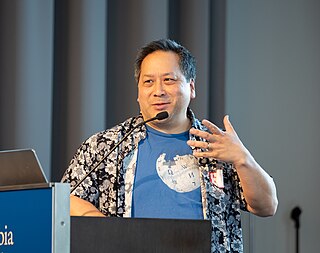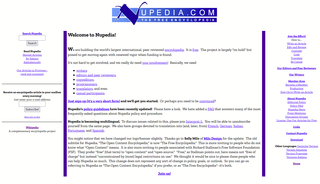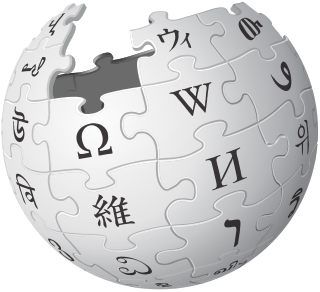
Enciclopedia Libre Universal en Español is a Spanish-language wiki-based online encyclopedia, released under the Creative Commons Attribution-ShareAlike License 3.0. It uses the MediaWiki software. It started as a fork of the Spanish Wikipedia.

The English Wikipedia is the primary English-language edition of Wikipedia, an online encyclopedia. It was created by Jimmy Wales and Larry Sanger on 15 January 2001, as Wikipedia's first edition.

GNE was a project to create a free-content online encyclopedia, licensed under the GNU Free Documentation License, under the auspices of the Free Software Foundation. The project was proposed by Richard Stallman in December 2000 and officially started in January 2001. It was moderated by Héctor Facundo Arena, an Argentine programmer and GNU activist.

The Portuguese Wikipedia is the Portuguese-language edition of Wikipedia, the free encyclopedia. It was started on 11 May 2001.

The Indonesian Wikipedia is the edition of Wikipedia in the Indonesian language. The Indonesian Wikipedia is the fifth-fastest-growing Wikipedia in an Asian language after the Japanese, Chinese, Korean, and Turkish language Wikipedias. It ranks 25th in terms of depth among Wikipedias. Its first article was written on 30 May 2003, yet its Main Page was created six months later on 29 November 2003.

The Serbian Wikipedia is the Serbian-language version of the free online encyclopedia Wikipedia. Created on 16 February 2003, it reached its 100,000th article on 20 November 2009 before getting to another milestone with the 200,000th article on 6 July 2013, and then another milestone with the 500,000th article on 13 January 2018.

The Kazakh Wikipedia is the Kazakh language edition of the free online encyclopedia Wikipedia, founded on 3 June 2002.

Florence Jacqueline Sylvie Devouard, is a French agricultural engineer who served as the chair of the Wikimedia Foundation board of trustees between October 2006 and July 2008.

The Spanish Wikipedia is a Spanish-language edition of Wikipedia, a free online encyclopedia. It has 1,976,234 articles. Started in May 2001, it reached 100,000 articles on 8 March 2006, and 1,000,000 articles on 16 May 2013. It is the 8th-largest Wikipedia as measured by the number of articles and has the 4th-most edits. It also ranks 28th in terms of article depth among Wikipedias.

The Japanese Wikipedia is the Japanese edition of Wikipedia, a free, open-source online encyclopedia. Started on 11 May 2001, the edition attained the 200,000 article mark in April 2006 and the 500,000 article mark in June 2008. As of September 2024, it has almost 1,429,000 articles with 12,652 active contributors, ranking fourth behind the English, French and German editions.

Jerry Michalski is an American technology consultant. He is the former managing editor of Release 1.0, a technology newsletter. He is the founder of Sociate.com and ReX.

Andrew Lih is an American new media researcher, consultant and writer, as well as an authority on both Wikipedia and internet censorship in the People's Republic of China. In 2013 he was appointed an associate professor of journalism at American University in Washington, D.C.

The Wolof Wikipedia is the edition of Wikipedia in the Wolof language. It currently has 1,701 articles.

Lawrence Mark Sanger is an American Internet project developer and philosopher who co-founded Wikipedia along with Jimmy Wales. Sanger coined Wikipedia's name, and provided initial drafts for many of its early guidelines, including the "Neutral point of view" and "Ignore all rules" policies. Prior to Wikipedia, he was the editor-in-chief of Nupedia, another online encyclopedia. He later worked on other encyclopedic projects, including Encyclopedia of Earth, Citizendium, and Everipedia, and advised the nonprofit American political encyclopedia Ballotpedia.

Nupedia was an English-language online encyclopedia whose articles were written by volunteer contributors with relevant subject matter expertise, reviewed by expert editors before publication, and licensed as free content. It was founded by Jimmy Wales and underwritten by Bomis, with Larry Sanger as editor-in-chief. Nupedia operated from October 1999 until September 2003. It is best known today as the predecessor of Wikipedia. Nupedia had a seven-step approval process to control content of articles before being posted, rather than live wiki-based updating. Nupedia was designed by a committee of experts who predefined the rules. It had only 21 articles in its first year, compared with Wikipedia having 200 articles in the first month, and 18,000 in the first year.
This is a list of books about Wikipedia or for which Wikipedia is a major subject.

The following outline is provided as an overview of and a topical guide to Wikipedia:

The Bambara Wikipedia is the edition of Wikipedia in the Bambara language, spoken in Mali, Burkina Faso and Senegal. This edition of Wikipedia contains 830 articles.

Various observers have predicted the end of Wikipedia since it rose to prominence, with potential pitfalls from lack of quality-control or inconsistencies among contributors.

Gujarati Wikipedia is the Gujarati language version of Wikipedia, an online encyclopedia. It was founded in July, 2004. It has 30,440 articles. As of September 2024, it generates 3 million monthly views.



















